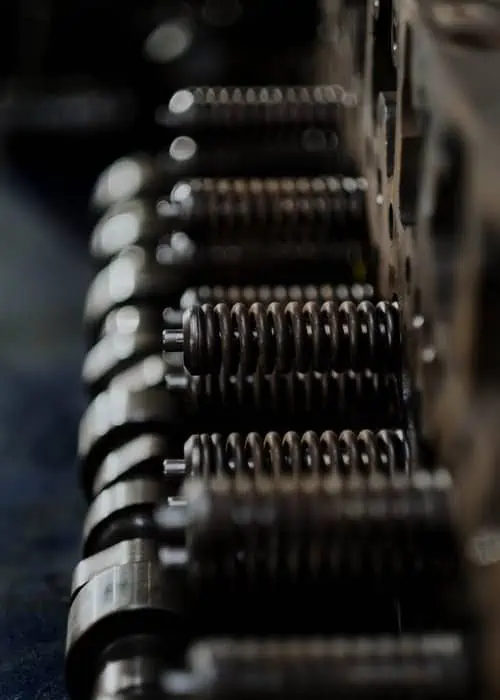Tick, tick, tick. Is that your engine I hear? If so, there’s a good chance you’re wondering what’s happening and whether or not you should be worried about it.
It’s normal for your engine to make some noise. After all, it is a machine with lots of moving parts. But sometimes that ticking noise can be a sign of a more serious problem. So what causes engine ticking, and when should you be concerned?
1. Normal Operating Noise
In some cases, the ticking noise may just be the engine operating normally. Newer cars have what’s called Active Noise Control which uses sound-canceling technology to make the engine noise less noticeable.
So, if you have a newer car, it’s possible that the ticking noise is just the engine operating normally and there’s nothing wrong with it. Other noises that should not bother you include:
- Noise from the purge valve that sounds like a hissing noise
- Fuel injectors and turbocharger or supercharger when they whine
- When you cold restart your engine, it may tick for a few seconds before the oil pressure builds up. But as long as the noise goes away after a few seconds, it’s nothing to worry about
- You may also hear a ticking noise when you first start the engine after it’s been sitting for a while. This is because the oil has pooled in the bottom of the oil pan and needs to circulate before it can lubricate the engine properly.
2. Low Oil and Pressure Levels
A mechanic working on an engine
If your engine is low on oil, or pressure it will start to overheat followed by a ticking noise. The oil is responsible for lubricating the engine’s moving parts. So, when it’s low, those parts can start to rub together and create friction- and that can lead to a ticking noise.
The same is also true for pressure. Engines need the right amount of oil pressure to function properly. If the pressure is too low, it can cause a ticking noise. This is usually accompanied by a warning light on your dash.
How To Fix It
What do you do if you think your engine is low on oil or pressure? First, check your oil level and pressure. If they’re low, add more and see if the noise goes away. If it doesn’t, or if you’re not sure how to check these things, take your car to a mechanic and have them take a look.
If your oil and pressure levels are fine, there are a few other things that could be causing your engine to tick.
3. Dirty Oil
A dirty oil cap
Dirty oil can cause all sorts of problems for your engine, including a ticking noise. Over time, the oil in your engine gets dirty and starts to break down. This can cause a build-up of sludge and debris, which can then clog up the engine and cause a ticking noise.
How To Fix It
The best way to fix this problem is to have your oil changed regularly. The rule of thumb is to change it every 5,000 miles (8,000 kilometers). But you should check your owner’s manual to be sure. This will help to keep your engine clean and prevent a build-up of sludge and debris.
4. Loose or Damaged Engine Components
Another potential cause of engine ticking is loose or damaged engine components. Things like the spark plugs, injectors, and exhaust system can rattle and cause a ticking noise if they’re loose or damaged.
The engine fan can also cause a ticking noise if it’s loose or damaged. The fan helps to cool the engine and prevent it from overheating. If it’s not working properly, it can cause the engine to tick.
How To Fix It
The best way to fix this problem is to take your car to a mechanic and have them check for loose or damaged components. They can then tighten or replace them as needed.
But if you consider yourself to be mechanically inclined, you can try to do it yourself. Just be sure that you know what you’re doing before you start messing around with your engine.
Use a mechanic’s stethoscope to help you find the source of the noise. Alternatively, you can also take your car for a drive and listen for the noise to get louder when you go over bumps. Once you find the source of the noise, tighten or replace the component as needed.
5. Worn Out Engine Parts
Close up photo of an engine cylinder head
Another possibility is that your engine is simply getting old and the parts are starting to wear out. As your engine ages, the parts start to wear down and don’t work as well as they used to. Parts such as the valves, lifters, and pushrods can all cause a ticking noise when they’re worn out.
How To Fix It
If you think your engine parts might be worn out, replace them with new ones. You can usually find replacement parts at your local auto parts store. These replacements can be costly, but it’s important to get them done so your engine can continue to run properly.
6. Rod Knocking
A rod knock is a knocking noise that you’ll hear coming from the engine. It’s louder and deeper than a ticking sound and normally comes from the engine top, sounding more internal.
It usually means that there’s something wrong with the connecting rods hitting the crankshaft. This usually happens when the bearings that allow the rods to rotate freely wear out. The knocking noise is the sound of metal on metal and gets worse as the engine speed increases.
It could also be caused by other things such as a loss of oil pressure, incorrect oil viscosity, or even a manufacturing defect.
How To Fix It
A rod knock normally means that the engine needs to be rebuilt or replaced. This is because the bearings need to be replaced and the rods need to be resized. It’s a pretty big job and will be expensive. So, expect to part with a lump sum amount to have it done.
7. Using the Wrong Oil
It is advisable that you use the oil recommended by your car’s manufacturer. This is because they’ve tested it and know that it works best for their engines.
Using the wrong oil can cause all sorts of problems such as engine knocking, increased wear and tear, and even engine failure. So, if you begin hearing a ticking noise after you’ve changed your oil, it’s possible that you’re using the wrong oil.
How to Fix It
To fix this problem, simply change your oil to the correct type. You can find this information in your car’s owner’s manual. Ensure that you also use the correct oil viscosity as this can also cause problems.
8. Bad Bearing
A loose front thrust bearing can also cause a ticking noise. The bearing allows the crankshaft to rotate freely and help support the weight of the engine. It’s located at the front of the engine and is what the timing belt or chain attaches to.
If the bearing is loose, it will make a knocking noise that will get worse as the engine speed increases. The noise will also be more pronounced when you go over bumps.
How to Fix It
If you suspect that the noise is coming from a loose bearing, remove the timing belt or chain and check the bearing. If it’s loose, tighten it or replace it as needed.
Exhaust Leak
Exhaust pipe of a yellow mustang sports car
The exhaust system is responsible for getting rid of the fumes and gases that your engine produces. The system is designed to be sealed so that the fumes don’t escape. A leak in the system may allow those fumes and gases to escape. This will not only cause a ticking noise but also a decrease in performance and fuel economy.
How To Fix It
Look for any cracks or holes in your exhaust system. This can be in the gasket, pipes, or muffler. To help you find the leaking area, there is normally soot or rust around it. Check for this. If you find a leak, have it repaired as soon as possible. This will help to prevent further damage.
10. Poor Maintenance
Just like any machine, a car needs to be properly maintained if it’s going to run smoothly. This means regular oil changes, checking fluid levels, and replacing worn out parts.
Failing to maintain your car properly will make it prone to all sorts of problems such as an engine knock, increased wear and tear, and even engine failure. So, if you’re hearing a ticking noise, it could be because you haven’t been maintaining your automobile properly.
How To Fix It
Change your oil and filters regularly, check fluid levels, and replace any worn out parts. You should also take your car to a mechanic for regular tune-ups. This will help ensure that your car is running properly and help prevent any future problems.
Here’s a YouTube video that illustrates more on the causes of engine ticking noise.
Conclusion
While this list is not all-inclusive, it covers some of the most common causes of engine ticking noise. If you are unsure of what is causing the noise in your engine, it’s best to take it to a mechanic and have them diagnose the problem. They will be able to tell you what is wrong and how to fix it.
In the meantime, hopefully, this article has given you some idea of what might be causing the noise and how to fix it.


Jim Wicks is the founder of MotorVehicleHQ. With over two decades of experience in the automotive industry and a degree in Automotive Technology, Jim is a certified car expert who has worked in various roles ranging from a mechanic, car dealership manager, to a racing car driver. He has owned more than 20 cars over the past 15 years. Ask him about any vehicle you see on the road and he can tell you the make, model and year. He loves the aesthetics of all things cars, and keeps his vehicles in pristine condition.
In his free time, Jim enjoys getting his hands dirty under the hood of a classic car or taking long drives along the country roads. His favorite car? A 1967 Shelby GT500, a true classic that, according to Jim, “represents the pure essence of American muscle.”




